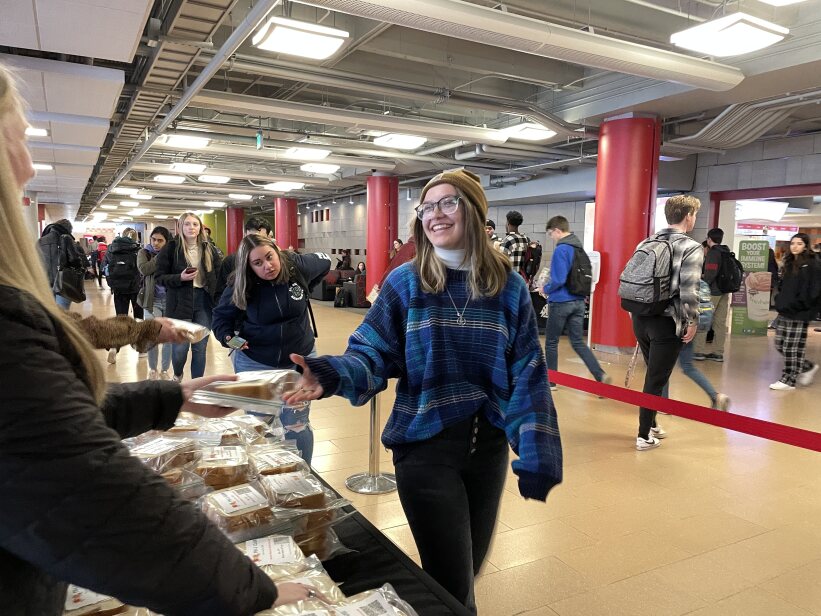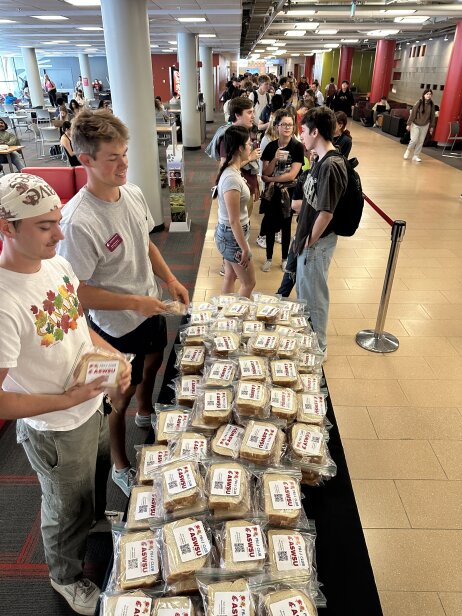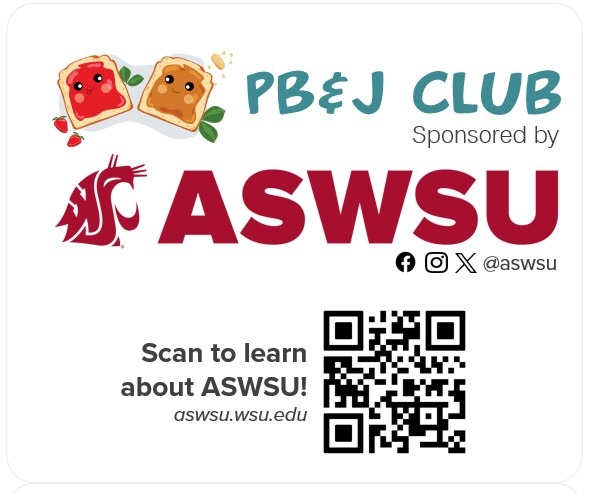Compton Union Programming: Building Campus Community One PB&J at a Time
Washington State University sophomore Janna Huber arrived at the Compton Union Building later than planned and found herself near the back of a long line of students. She could barely see the table about 40 yards away where hundreds of sandwiches were being stacked in preparation for the weekly PB&J Club giveaway.
“I’m not sure if I’ll keep hanging back here,” Huber said with a sad voice, “but it sure would be nice to get a PB&J.”
No sooner did she finish her sentence than the line of students began to move. The closer she got to the table, the bigger her smile became, until she held one of the coveted sandwiches in her hand.
“This is super cool!” she exclaimed.
Huber’s excitement about receiving a sandwich is a common reaction for students lucky enough to get one. Compton Union Building, or the CUB as it is known, hosts a weekly PB&J Club giveaway that regularly attracts hundreds of students who hope to nab one of the freshly made sandwiches.
The club is a Washington State tradition that started in 2008, when the Associated Students of Washington State University wanted to find a way to provide free food to students while connecting them with activities, resources, and key staff and faculty. It became an instant hit, and during the first year, Associated Students gave away over 7,000 sandwiches. The club remained popular with students for a couple of years, but as new student leaders with different priorities came on board, it faded away.
But the club made a comeback in 2021 when Union Director Karee Shaw organized a PB&J Club event to help kick off the new school year.
“Students were returning to campus for the first time following the pandemic, and we were looking for things we could do to attract students back into the CUB,” said Shaw. “I remembered how the PB&J Club drew students into the building years ago and thought it could once again help us recreate a sense of community.”
That event was so successful that Shaw brought back the weekly club, distributing 250 free sandwiches to students each Wednesday during the academic year.
PB&J Club provides a unique opportunity for staff and faculty to engage with students. At the same time, it gives the CUB opportunities to develop new partnerships and strengthen old ones with offices and departments across campus.

The club is sponsored each week by a different campus department or organization. With dozens of academic colleges and departments, student affairs units, and Washington State athletics offices on campus, the number of potential sponsors seems endless.
Sponsors are mostly based in student affairs, but all campus departments and offices are encouraged to participate. One of the most popular PB&J Club events in the 2022–23 academic year was sponsored by university athletics, when head coaches of the football and men’s and women’s basketball teams handed out sandwiches. Students were thrilled to interact with some of the most recognizable people on campus and learn more about the athletics programs and its leadership.
That kind of personal interaction is what makes PB&J Club effective—and it’s becoming more significant as universities increasingly rely on technology to share information with students. PB&J Club provides an alternate, and much more personal, method of engaging with students. It is very effective—and a lot of fun.
Associated Student President Luke Deschenes signed his team up for the first PB&J Club of the 2022–23 academic year so he and his student government colleagues could gauge how students were doing during the first week of classes.

“We know it is very important for students to make connections early in the year, and the PB&J Club is a great way to interact directly with a lot of students”
—Brian Shuffield
“The more students become aware of why we are here and what Associated Students of Washington State University does, the more likely student involvement on campus will increase,” Deschenes said. “It was incredibly valuable to have this opportunity to meet with students face to face and to receive immediate feedback.”
The Center for Student Organizations and Leadership sponsored the PB&J Club the following week to help promote a fair designed to get students involved in campus organizations. The center provides training and resources for over 400 student organizations and offers programs and events that help students build leadership skills.
“We know it is very important for students to make connections early in the year, and the PB&J Club is a great way to interact directly with a lot of students,” said Brian Shuffield, executive director of student engagement services. “We plan to be a sponsor two more times this semester to promote our leadership programs.”
Elevating the Experience for Students
For a program that makes such a positive impact at the university, it is relatively easy to manage. As each new semester approaches, Shaw sends an email inviting campus constituents to sponsor one or more weeks of the club.
Each sponsor contributes about $500 to help cover the cost of the sandwiches, and in return, they get the opportunity to hand them out to students while highlighting their programs and events.
The sandwiches go quickly, so departments often maximize their time with students by setting up informational displays beforehand and distributing flyers to those in line. Even the sandwich wrappers are adorned with a customized sticker that includes a QR code to direct students to additional resources identified by the event sponsor.
Because the sandwiches are central to driving student engagement, the CUB partners with university dining services to make sure they are something students will be eager to get. Amy Gibson, university catering sales manager, said the sandwiches are usually made by the same three student employees who have become expert peanut butter and jelly sandwich makers.
The sandwich-making process begins a day before the giveaway. The student employees cover two large counters in the kitchen with plastic wrap, lay out the pieces of bread, and use scoops to transfer the peanut butter and jelly from the jars to the bread. After the sandwiches are assembled, the students wrap them and place them in boxes to be transported to the CUB. The crew works as a well-oiled machine, usually finishing the job in about an hour and a half.
While making so many sandwiches might seem monotonous to some, Gibson said her team finds ways to make it fun.
“Sometimes the song ‘Peanut Butter Jelly Time’ (by the Buckwheat Boyz) can be heard over the speaker in the kitchen while the sandwiches are being made and the entire kitchen staff sings along, laughs, and has a good time,” she said.

The sandwich wrappers are adorned with a customized sticker that includes a QR code to direct students to additional resources identified by the event sponsor.
Every semester, the PB&J Club goes through 450 loaves of bread, roughly 45 large containers of creamy peanut butter, and 60 large containers of jelly. The sandwich makers rotate the flavors of jelly between strawberry, raspberry, and blackberry, so no two weeks in a row are the same. The sandwiches are vegan but not gluten free.
“The sandwiches are big and made with soft bread and good ingredients,” said Elias Gould, a sophomore majoring in mechanical engineering. “They are definitely worth standing in line for.”
That kind of feedback is music to Gibson’s ears, as her team strives to provide PB&J sandwiches that keep students coming back week after week.
“We want to keep the traditional taste and comfort of a PB&J that may remind students of home, maybe that traditional sandwich in their lunch box growing up,” she said. “It makes us happy to know students look forward to the sandwiches we make every week.”
Part of the Washington State Culture
PB&J Club certainly creates a buzz in the CUB, and Lucila Loera and her team in the Office for Access and Opportunity are always excited to be a part of it. Loera’s office provides outreach and support programs for first-generation, low-income, and undocumented students, as well as students with disabilities through programs like the High School Equivalency Program, the College Assistance Migrant Program, and federally funded TRIO programs such as Student Support Services and Upward Bound.
Loera, the executive director, sponsors PB&J club two or three times a year because she knows her staff will be able to interact with a large group of students. She said the CUB makes it easy to be involved and her team really enjoys the experience—so much so that they always arrive early to mingle with the students waiting in the sandwich line.
“It’s an opportunity to start a conversation with students who might be eligible for TRIO or one of our other programs,” she said. “The students always seem to be happy, in a good mood, and open to listening.”
Eric Holtrop, a junior math major who estimates he came to a dozen PB&J Club events in the 2022–23 academic year, said he enjoys talking with the different department representatives and appreciates the information they share. When he is not talking with one of them, he is usually meeting somebody new in line or catching up with a friend.
One day last year, he met a student in line who taught him how to solve a complicated math problem involving square roots, and he returned the favor by teaching the student how to use his fingers to perform calculations involving large numbers. They ended up exchanging phone numbers.
“I like to think of the PB&J Club as part of the Washington State culture, where you can meet your friends and make new ones,” Holtrop said. “The free food is very important, but to me it is about more than that.”
Food Insecurity
A study conducted in 2022 by the Washington Student Achievement Council found that nearly one in three Washington college students surveyed has experienced food insecurity. Washington State University students experiencing food insecurity can gain access to food through the Cougar Meal Swipe program and the Cougar Food Pantry. Cougar Meal Swipe provides a way for eligible students to privately request funds that can be used at campus dining locations. On average, the program receives 30 requests per day and up to 80 requests per day during peak times. The Cougar Food Pantry, located in the Compton Union Building, supplies free food to all students (undergraduate, graduate, and professional) on the Washington State–Pullman campus. Over 2,000 students visit the pantry every month during the academic year.
In addition, the Washington State legislature earlier this year adopted House Bill 1559, known as the Establishing the Student Basic Needs at Public Postsecondary Institutions Act. Washington State was chosen as one of two public institutions in the state to pilot the program, which gives the campus $48,000 over two years to support first-year, Pell-eligible, or Washington Application for State Financial Aid students living in residence halls who are experiencing food and housing insecurity.
In the United States, according to research conducted by the U.S. General Accounting Office, about 60% of college students who are eligible to receive food assistance benefits do not. This has led states and the federal government to reevaluate student food assistance programs that in some cases require students to be in their final semester, to work at least 20 hours
a week, and/or participate in a work study program.

